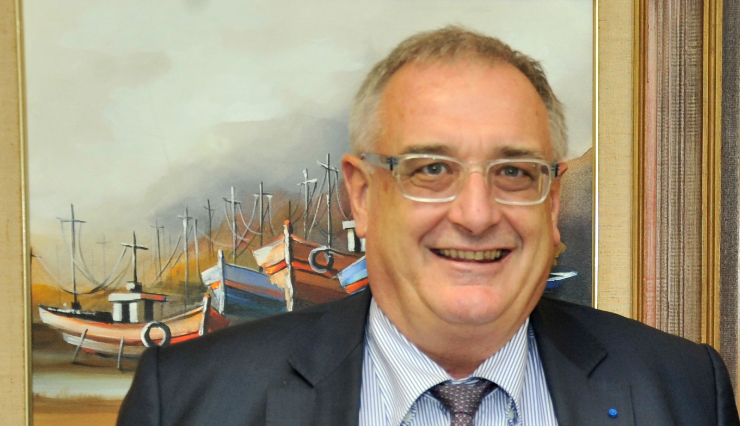The Strategist Six: Hervé Guillou
Posted By Brendan Nicholson on October 25, 2017 @ 06:00

Welcome to The Strategist Six, a feature that provides a glimpse into the thinking of prominent academics, government officials, military officers, reporters and interesting individuals from around the world.
1. As chairman and chief executive of Naval Group, are you confident that your company’s project to design and build 12 submarines for the Royal Australian Navy is progressing on schedule and that the submarines will be delivered on time?
The submarine program is real and on time. We are executing the design and mobilisation contract and coordinating with Lockheed Martin Australia (which will install the combat system). The preliminary design has been finalised, so the submarine’s dimensions are now agreed. We are putting a great deal of effort into maturing the design. We are currently working with the Commonwealth in regards to what components and systems will be required. We’re also working on the shipyard infrastructure contract which will inform the design and build of the construction yard in Adelaide. We’ve begun recruiting the Australian specialist workforce that will be needed in both France and Adelaide. On any project of this scale problems may be encountered, but enough flexibility has been built into the timetable to allow us to solve them.
2. How difficult is it to convert the design for a nuclear-powered submarine to conventional power and will the diesel-electric power plants provide enough energy to meet both the propulsion requirement and the high hotel load of such a large submarine?
We are not converting a nuclear submarine to a conventional submarine. This will be a unique submarine designed to meet Australia’s specific requirements. Due to the sensitive nature of the program, we are unable to discuss specific requirements (such as the hotel load) of the future submarines. The submarine designed by Naval Group to meet Australia’s requirements will provide sufficient energy to run the submarine.
3. At the Pacific 2017 conference it was suggested by the Naval Group executive director in charge of the Australian project, Jean-Michel Billig, that the company was designing the Shortfin ‘from scratch’. That appeared to contradict the Naval Group’s longstanding position that the Shortfin Barracuda would be broadly based on the design of the nuclear-powered French Barracuda. Can you clarify the relationship between the Shortfin and the Barracuda?
While Australia’s submarine will be a unique design, the nuclear Barracuda submarine being built for the French Navy remains the design reference for it. Its design will incorporate the best in conventional technologies. It is likely to use some equipment already tested in Naval Group’s Scorpene submarine.
4. It is widely accepted in Australia that Naval Group’s intention has been to use its advanced pump jet propulsion system in the new submarine and that the company believes that will give it a significant advantage over boats with propellers. But Mr Billig said the vessels ‘may end up with conventional propellers’. Is the Australian submarine likely to be fitted with the pump jet or the propulsor?
Naval Group is the manufacturer of both conventional propeller-driven submarines and larger nuclear submarines with the propulsor. The propulsor’s inclusion means the future submarine will move more quietly than submarines with obsolete propeller technology. In a contest between two otherwise identical submarines, the one with the pump jet always has the tactical advantage. The propulsor was an integral part of our bid. The Department of Defence says it intends to use the pump jet propulsion system.
5. How concerned are you about problems, reported in the French media, with the Barracuda program in France? And does that have any implications for the Australian project?
The assembly of the first of class, the Suffren, is complete and all equipment is on board. Nevertheless, the setting to work and functional testing of the power plant is taking longer than expected and is impacting the schedule for the commissioning of the Suffren. This has no impact on the schedule of the following submarines. The status of the French Barracuda will have no impact on the Australian program.
6. What proportion of the submarine’s components are likely to be manufactured in Australia?
We are about 12 months into a 50-year program. At the moment we are establishing all of the plans, processes and procedures for how we move forward. We are working closely with the Commonwealth and Lockheed Martin Australia, the combat system integrator, to determine the design and layout of the submarine and the systems that will go into them. We are working through the submarine component by component, system by system, in partnership with the Commonwealth, to work out which components need to be made and/or maintained in Australia to achieve a sovereign capability. We are currently looking at the top five components: electrical switchboards, the main motor, batteries, diesel generators and the weapon launch system. If components can’t be sourced from Australia, we will do everything we can to ensure that they can be maintained, supported and modified in Australia. We will work with the suppliers of equipment to ensure there is a full technology transfer and that Australian industry is able to maintain and support this equipment to ensure Australia achieves a sovereign submarine capability. It’s a very methodical process and once we have finished, we will be able to provide a firm percentage figure to the Australian public. There’s a huge amount of work to be done and we need to take our time to ensure we get everything right.
Article printed from The Strategist: https://aspistrategist.ru
URL to article: /the-strategist-six-herve-guillou/
Click here to print.